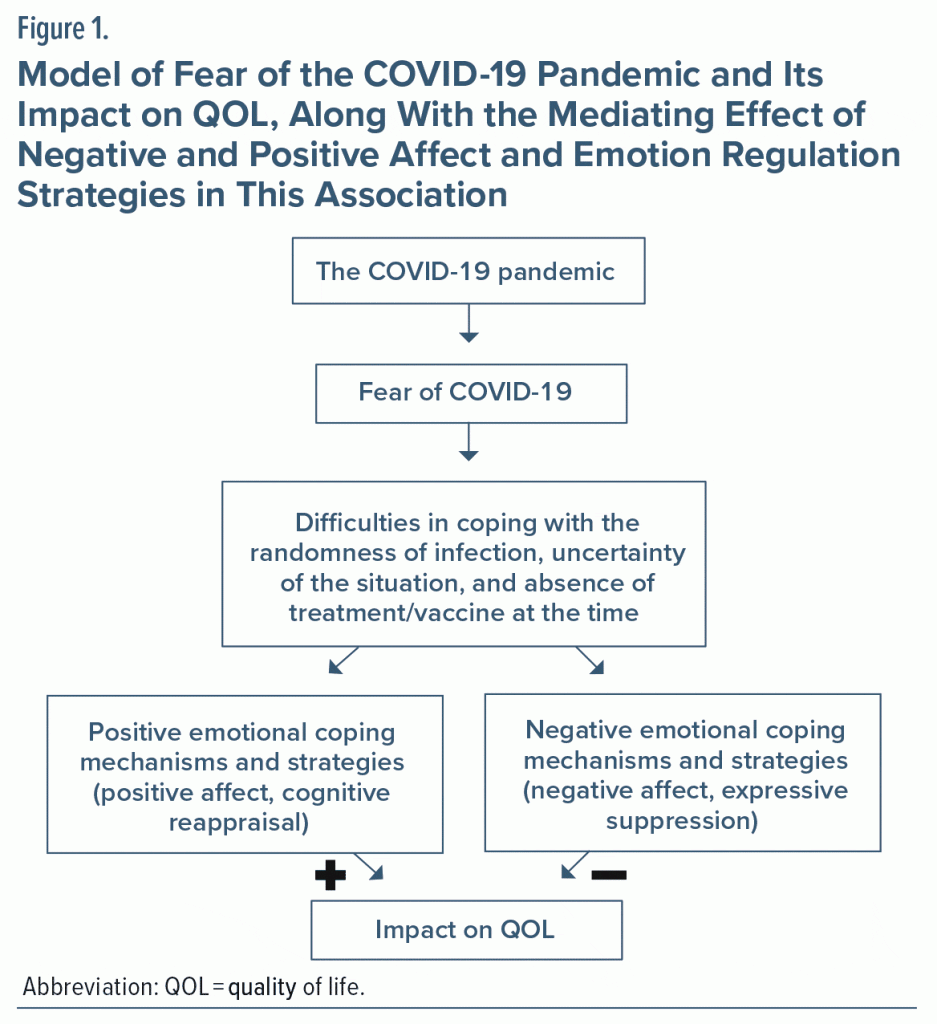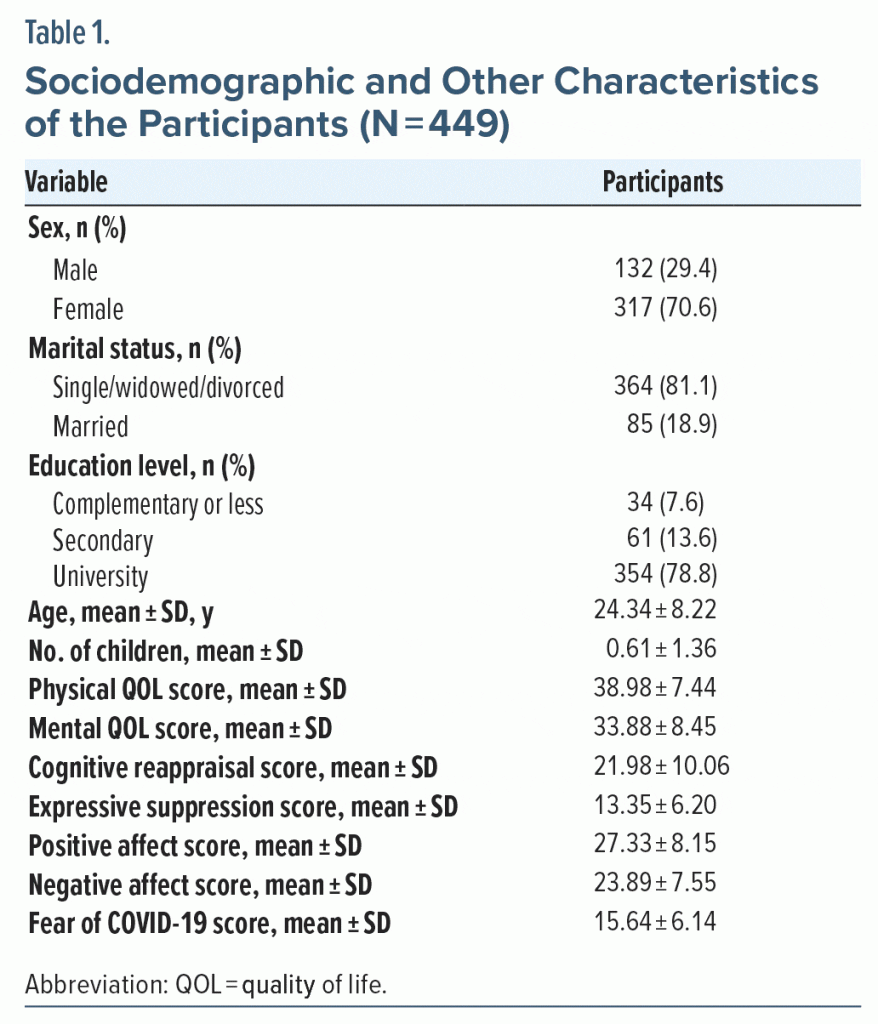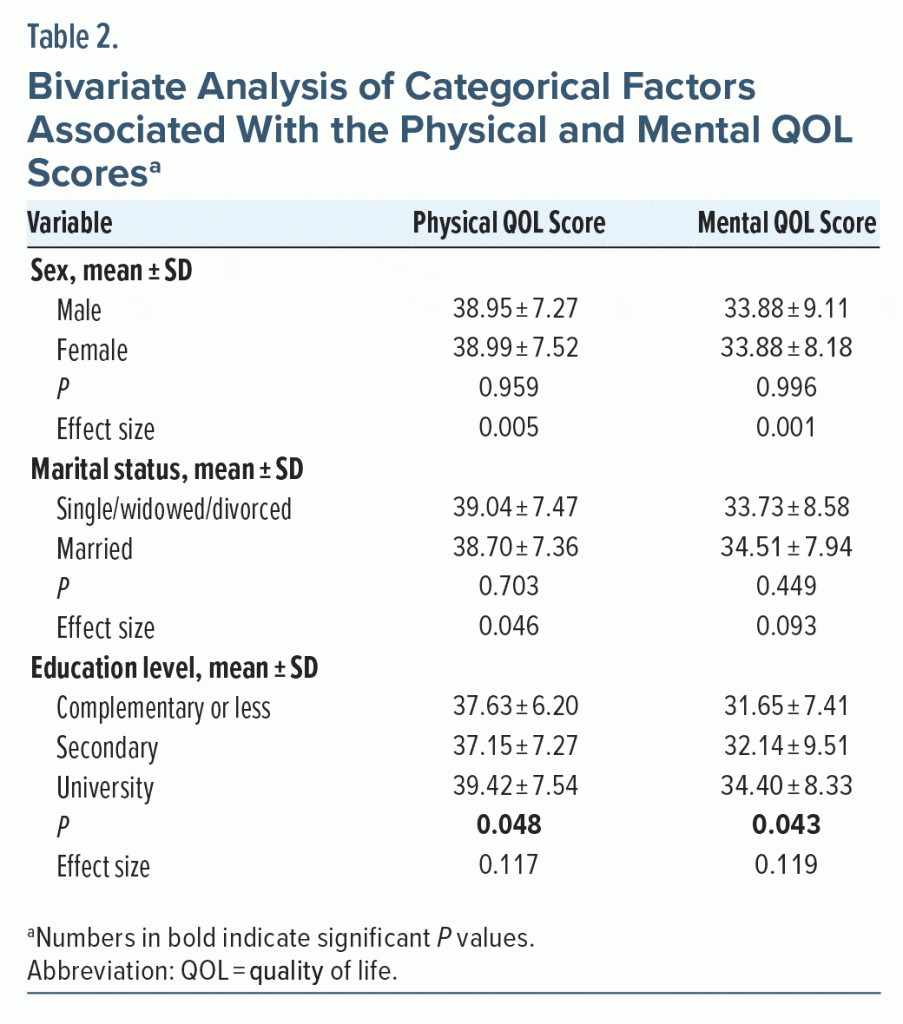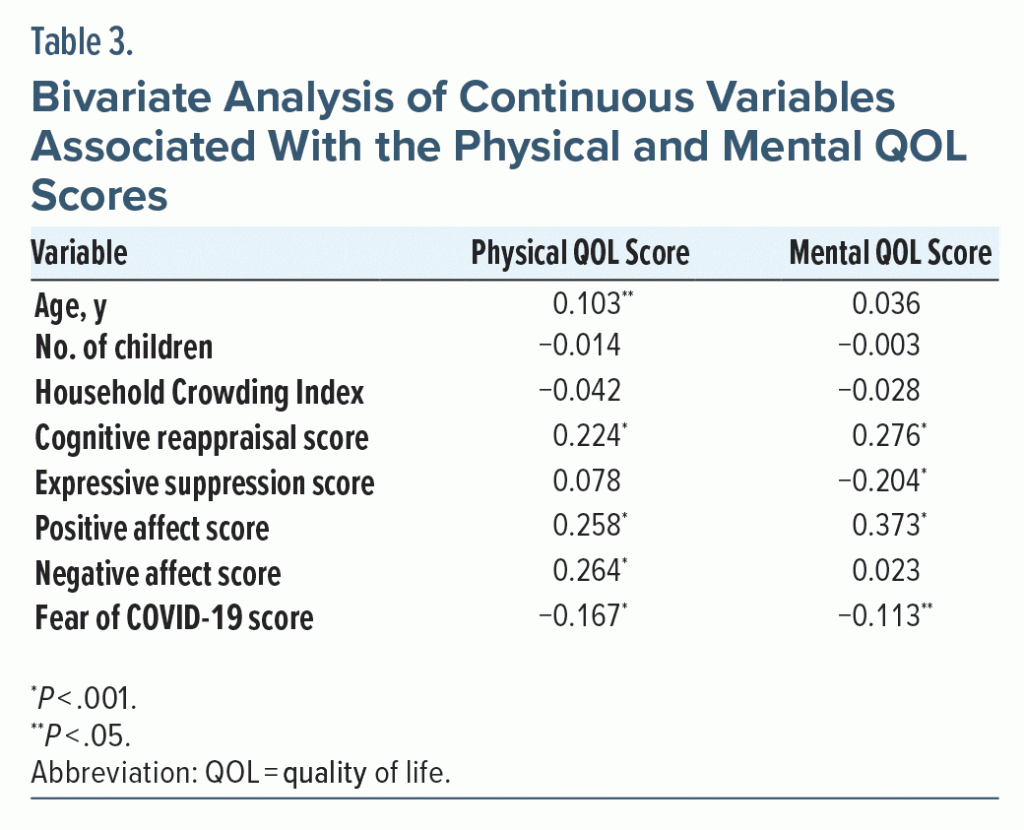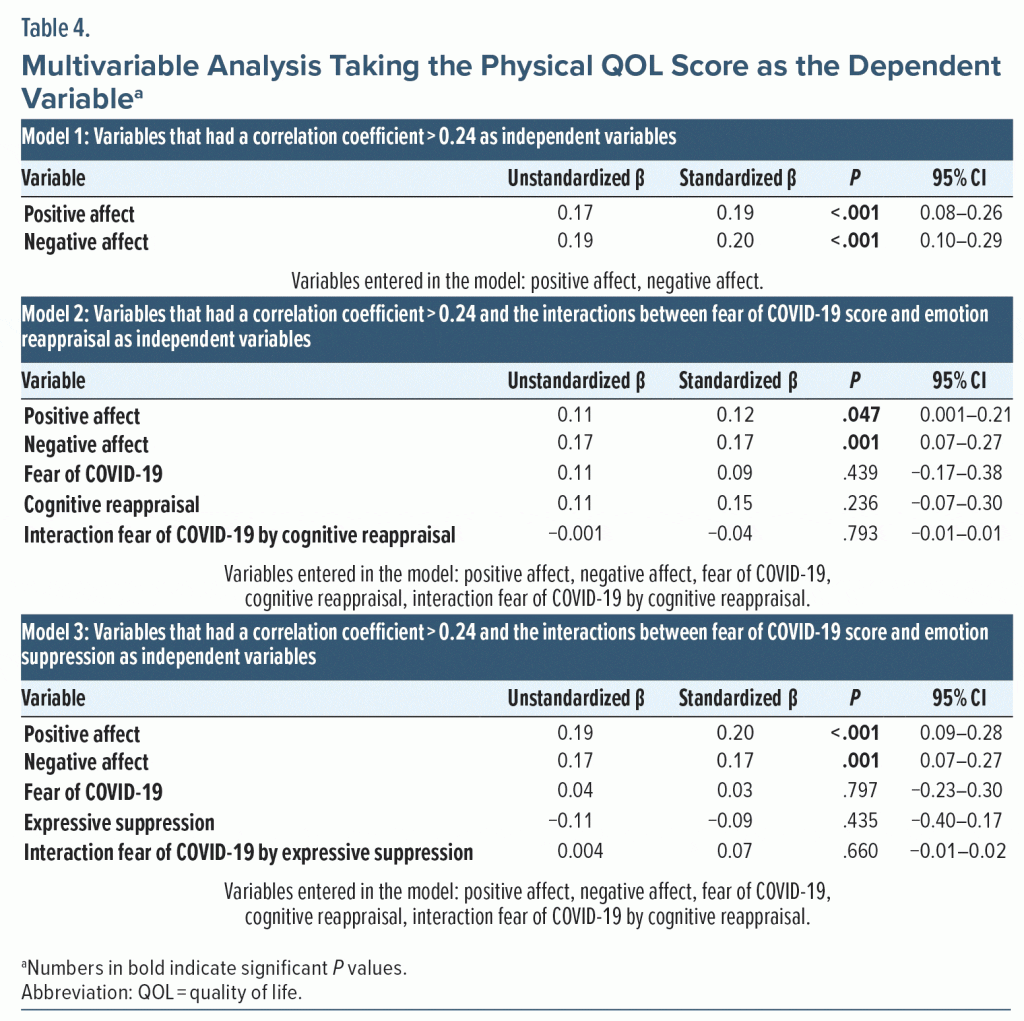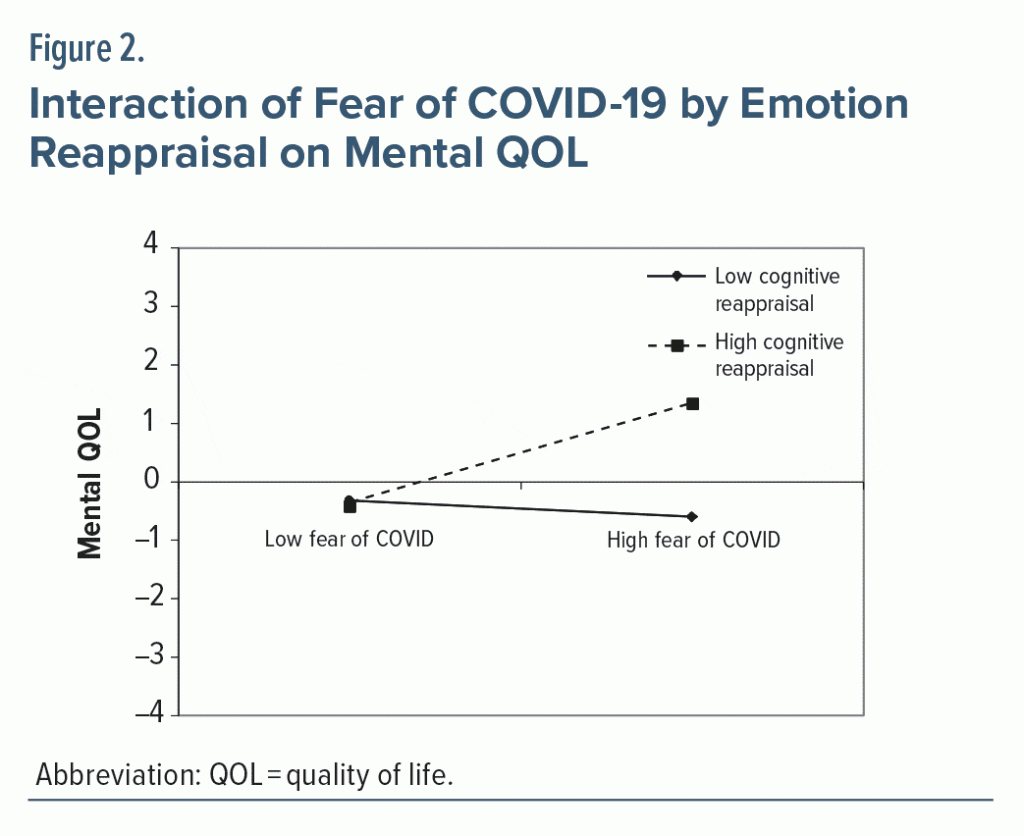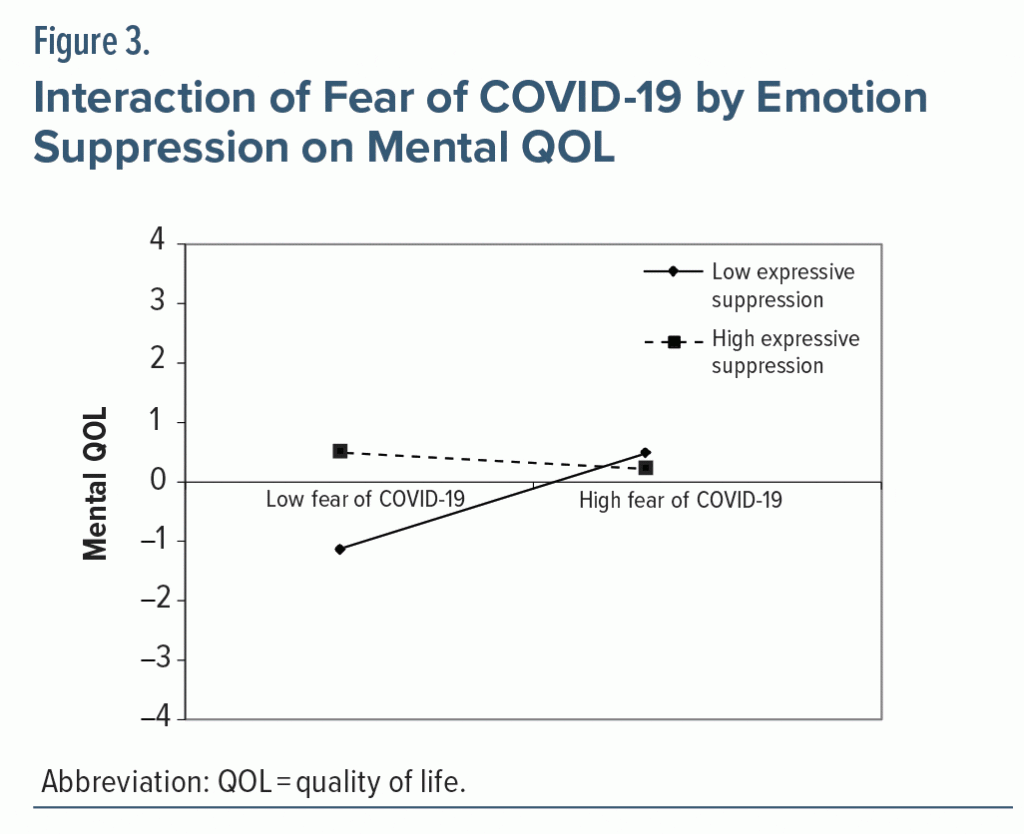This work may not be copied, distributed, displayed, published, reproduced, transmitted, modified, posted, sold, licensed, or used for commercial purposes. By downloading this file, you are agreeing to the publisher’s Terms & Conditions.
Original Research
The Moderating Effect of Emotion Regulation Between Fear of COVID-19 and Quality of Life Among Lebanese Adults
Published: November 16, 2023
ABSTRACT
Background: To evaluate the moderating effect of emotion regulation between fear of COVID-19 and quality of life (QOL) among a sample of Lebanese adults.
Methods: This cross-sectional study included 449 participants who completed an online survey (between December 2020 and January 2021).
Results: Higher positive (P = .047) and negative (P = .001) affect were associated with better physical QOL. Higher positive affect (P < .001) and cognitive reappraisal (P = .031) were associated with better mental QOL. The interactions fear of COVID-19 by cognitive reappraisal (P = .002) and fear of COVID-19 by expressive suppression (P = .003) were significantly associated with mental QOL. In people with high fear of COVID-19, high cognitive reappraisal and low expressive suppression were associated with better mental QOL.
Conclusions: The results suggest that those providing mental health services during a pandemic should bolster their patients’ use of cognitive reappraisal rather than expressive suppression and positive affect rather than negative affect to improve their mental and physical QOL. Awareness in all settings, from home to school/university to workplace, is recommended to restore balance in the lives of individuals during stressful times, with emotion and mental health at the center.
Prim Care Companion CNS Disord 2023;25(6):23m03546
Author affiliations are listed at the end of this article.
The World Health Organization (WHO) defines quality of life (QOL) as an “individual’s perception of their position in life in the context of the culture and value systems in which they live and in relation to their goals, expectations, standards, and concerns.”1 QOL is therefore not interchangeable with quantity of life; it goes beyond longevity and revolves more around the concepts of happiness, a comfortable lifestyle, and self-realization.2 Research has linked poor mental and physical health with a poorer quality of life.3 As such, stressful lockdowns during pandemics like COVID-19 have also been linked to a lower QOL.4
WHO declared COVID-19 a public health emergency on January 30, 2020 before declaring it a pandemic on March 11, 2020.5 With it being the first pandemic after the SARS (severe acute respiratory syndrome) outbreak,6 governments across the world implemented lockdown policies and encouraged safety practices, including wearing masks and social distancing, due to the rapid human-to-human transmission of the virus.7 As such, people’s daily routines were severely disrupted.
A review by Brooks et al8 showed that the psychological impact of implemented quarantines in previous virus outbreaks—such as H1N1 and SARS—included negative effects such as anxiety, anger, and posttraumatic stress. Reduced emotional well-being has been associated with self-isolation while engaging with social media, which rapidly turned into the daily routine of citizens under lockdown.9 The severity of the impact of health emergencies on individuals’ psychology differs with degree of exposure; for example, health care workers during the SARS outbreak reported the highest levels of emotional distress.10 To delve deeper, previous studies have attributed low subjective well-being during the SARS pandemic to 2 main reasons: first being one’s fear of mortality and the second being fear of infecting others.11 This fear during pandemics can result in amplified psychological distress.12
Fear is a universal emotion, and several complex emotions such as irrational anxiety, phobias, and panic build upon it.13 During health emergencies, while fear’s ability to provoke a sense of threat in individuals can have benefits including the participation of individuals in safety practices, it can also have detrimental consequences14 such as stockpiling of food, sanitizers, and toilet paper15,16 or avoiding seeking professional health care services when needed.17 A previous study18 among Saudi adults found that the increased fear of COVID-19 was associated with lower mental well-being scores and hence with a poorer QOL. The role of emotion thus increases as a means of ameliorating the effects of fear on an individual’s QOL.
Affect, an important aspect of emotion, is now accepted as playing an important role in one’s cognitive processes and decision making since information-seeking behaviors tend to rely on the individual’s mood.19 Life satisfaction along with high positive affect and low negative affect contribute to an individual’s subjective well-being, and it is considered an indicator of mental health, especially in the context of health emergencies like the COVID-19 pandemic.20
Additionally, Gross21 defined emotion regulation as a process by which individuals manage the emotions they have in addition to the timing, severity, experience, and expression of those emotions. Also noteworthy, emotion regulation is a process that includes cognitive, acceptance, and behavioral strategies.22 The 2 most common emotion regulation tactics are cognitive reappraisal and expressive suppression. The former presents a means to yield positive emotions from negative emotions by providing awareness of when those negative emotions arise and of the harmful stressors that cause them.23,24 The latter, on the other hand, is a process by which an individual prevents internal emotions from being externally expressed, for example, through facial expression.23
Previous studies have shown that depression, anxiety, stress, and fear from COVID are correlated with a poorer QOL.25–27 However, several studies28,29 focused on how certain emotion regulation strategies—such as cognitive reappraisal—are able to enhance an individual’s QOL and well-being as opposed to the effects of expressive suppression.
Additional research showed that the effects of COVID will entail prolonged psychosocial and emotional consequences.30 Only a few studies31,32 have investigated the role of emotion in enhancing or depreciating one’s QOL, especially within the context of the fear imposed by a pandemic. The proposed association between the fear of COVID-19 and QOL is illustrated in Figure 1.
This study aimed to assess the association between the fear of COVID-19 and QOL among a sample of Lebanese adults, taking into consideration the moderating role of emotion regulation. We hypothesized that positive affect and emotion regulation that focuses on resolving the stressors rather than focusing on the problem—ie, cognitive reappraisal—are associated with a better QOL, both mentally and physically, whereas the opposite would be associated with negative affect and negative strategies of emotion regulation, such as expressive suppression.
METHODS
Study Design
This cross-sectional study was carried out during the COVID-19 pandemic when various national lockdowns were enforced (between December 2020 and January 2021); 449 participants filled out an online questionnaire. A snowball technique was implemented across Lebanese governorates to obtain the study sample. Before filling out the questionnaire, participants were provided with an overview of the study objective and were assured of their anonymity in response. Inclusion criteria were adults aged ≥ 18 years residing in Lebanon. Exclusion criteria were individuals who declined to take part in this study.33,34
Minimal Sample Size Calculation
For a 5% α error, a power of 80%, and 10 factors to be included in the linear regression models, a minimum of 395 participants would be needed, according to calculations by the G-power software.
Questionnaire
The Arabic language was employed in the questionnaire. A sociodemographic section was included in the questionnaire in addition to a scale-based category.
Sociodemographic Data
This category of the questionnaire collected general sociodemographic data about individual respondents, including but not limited to age, income, marital status, and education level. In addition, the number of family members and rooms per household (except bathrooms and kitchens) were collected to calculate the Household Crowding Index, which is the ratio of the former to latter.35 The following scales were used in questionnaire.
Quality of Life Short Form‐12 Health Survey
Validated in Lebanon,36 this survey comprises 12 items to assess physical (physical component summary [PCS]) and mental (mental component summary [MCS]) QOL. A higher QOL physically and mentally is designated by a higher score.37 (Cronbach α in this study = 0.746 for both subscales.)
Fear of COVID-19 Scale
The Fear of COVID-19 Scale is used to measure the level of fear an individual carries toward COVID-19, and it was validated in the Arabic language.38 The scale has 7 questions that are rated on a 5-point Likert scale, ranging from strongly disagree to strongly agree, with higher scores indicating greater fear of COVID-19.39 An example of these items is “My heart races or palpitates when I think about getting COVID-19.” (Cronbach α in this study = 0.884.)
Emotion Regulation Questionnaire
The Emotion Regulation Questionnaire,40 validated in Lebanon,41 is used to assess individuals’ tendency to regulate their emotions via cognitive reappraisal and expressive suppression. The instrument comprises 10 items, which are responded to on a 7-point Likert-type scale, ranging from 1 (strongly disagree) to 7 (strongly agree). (Cronbach α for cognitive reappraisal in this study = 0.922 and expressive suppression = 0.844.)
Positive and Negative Affect Schedule
Validated in Arabic,42 the Positive and Negative Affect Schedule43 is used to measure mood or emotion. This instrument comprises 10 items to measure positive affect and 10 items to measure negative affect scored on a 5-point Likert scale. (Cronbach α in this study = 0.912 for positive affect and 0.880 for negative affect.)
Statistical Analysis
Statistical analysis was carried out using SPSS version 25. PCS and MCS QOL scores ranged between −2 and +2. and the kurtosis and skewness of the data proved the sample to be of normal distribution.44 To compare 2 means, a t test was carried out, whereas analysis of variance tests were used to compare ≥ 3 means. A Pearson correlation test was conducted to correlate 2 continuous variables. Finally, linear regression was used where higher scores indicated a higher QOL in the physical and mental aspects. To obtain a more parsimonious model, linear regression was performed on independent variables that had a correlation coefficient > 0.24.45 The final model also studied each emotional subscale (reappraisal and suppression) and fear of COVID-19. Significance was set at P < .05.
RESULTS
Sociodemographic and Other Characteristics of the Participants
Of 590 individuals approached for this study, 449 participants (76.10%) consented to participate (mean age = 24.34 years, 70.6% female). For more information about participants, please refer to Table 1.
Bivariate Analysis
Individuals with a university level of education had significantly higher mean PCS and MCS scores compared to those with other education levels (Table 2). Higher cognitive reappraisal and positive and negative affect scores were significantly associated with higher PCS scores, whereas higher cognitive reappraisal was significantly associated with higher MCS scores. Higher expressive suppression was significantly associated with lower MCS scores, whereas more fear of COVID-19 was significantly associated with lower PCS and MCS scores (Table 3).
Multivariable Analysis
More positive (B = 0.17) and negative (B = 0.19) affect was significantly associated with higher PCS scores (Table 4, Model 1). The interactions of fear of COVID-19 by cognitive reappraisal and fear of COVID-19 by expressive suppression were not significantly associated with physical QOL (Table 4, Models 2 and 3).
Higher positive affect (B = 0.33) and cognitive reappraisal (B = 0.09) were associated with higher MCS scores (Table 5, Model 1). The interactions of fear of COVID-19 by cognitive reappraisal and fear of COVID-19 by expressive suppression were significantly associated with MCS scores (Table 5, Models 2 and 3). In people with high fear of COVID-19, high cognitive reappraisal (Figure 2) and low expressive suppression (Figure 3) were significantly associated with higher MCS scores.
DISCUSSION
Positive Affect and QOL
While studies found that social distancing and lockdowns had negative consequences on mental health, including anxiety, posttraumatic stress, and depression,6,46 our study found that positive affect is associated with higher mental QOL. This finding is consistent with a previous study,47 and also another48 that correlated positive affect with a better mental QOL, as positive affect is related to higher levels of activity, focus, and pleasure, whereas negative affect is linked to feelings of sadness and lethargy. According to Blasco-Belled et al,49 individuals with positive affect are able to grasp the “big picture” to facilitate their problem-solving skills rather than focusing on the problem itself. On the other hand, another study50 found that individuals who focus on those negative thoughts and emotions are expected to engage in negative coping strategies.
Positive affect has been associated with better physical QOL, which could be because poor mental health or well-being is linked to poorer physical health.51 A meta-analysis52 also found that positive affect is associated with lower risk of mortality in certain age groups. Other studies focused on cardiovascular health53 as well as slower progression of disease in patients with HIV.53,54 Flory et al55 found that serotonergic function was higher in patients with positive affect and a positive mood, even after controlling for negative affect.
Negative Affect and QOL
Regarding negative affect, our results positively correlated it with better physical QOL. This finding opposes our hypothesis and is inconsistent with other studies that investigated this correlation. Kuiper and Harris56 found that higher levels of negative affect were correlated with an increased number of physical symptoms, and another study57 correlated negative affect with increased symptoms in HIV patients. This inconsistency may be attributed to our study being carried out during a pandemic, and fear might have caused individuals to look after their health.
Emotion Regulation and QOL
Our study also found an association between higher use of cognitive reappraisal and better mental QOL. Similar results were found in a study58 wherein cognitive reappraisal was associated with better life satisfaction as well as less depression. Cognitive reappraisal enables individuals to deal with negative emotions to achieve a better QOL.59
In addition, our results show that cognitive reappraisal is associated with higher mental QOL in individuals with high fear of COVID-19, which agrees with a previous study60 that found that nurses with cognitive reappraisal were able to decrease the stressors of their work and score higher in terms of mental well-being. In addition, compared to patients with clinical anxiety or depression, healthy controls were more likely to use cognitive reappraisal as an emotion regulation strategy.61
Interaction Analysis
Individuals with higher fear of COVID-19 were found to score better in terms of mental QOL when they had lower expressive suppression scores. Similar results were found in China62 wherein low expressive suppression and high cognitive reappraisal engagement were associated with lower posttraumatic stress. High expressive suppression was also associated with chronic posttraumatic stress disorder63 and depression and anxiety,64 possibly due to indications that expressive suppression can intensify the physiologic response to stress.
Clinical Implications
In the era of COVID-19 and its global consequences, the QOL of the population has been highly affected. Enabling individuals to deal with and adapt to the new settings/environments is crucial. Positive mental appraisal is key. Awareness in all settings, from home to school/university to the workplace, is recommended to restore balance in the lives of individuals during these stressful times, with emotion and mental health at the center.
Limitations and Strengths
Our study had some limitations, such as not accounting for demographic cofounding variables such as sex and marital status. Most respondents were single, and being alone during the lockdown could further affect these individual’s general QOL as does self-isolation. Moreover, the results may exhibit information bias since they were collected through a self-administered online questionnaire. A selection bias is present because of the recruitment technique followed and the nonresponse rate.
However, this study does exhibit several strengths. It is the first, to our knowledge, to investigate the association of different emotion regulation strategies with QOL during the COVID-19 pandemic within the Lebanese population. Not only did it focus on the mental aspect of QOL, but it also took the physical aspect into consideration and found an association with positive affect. These results provide insight regarding the adjustments that should be made in terms of lockdown policies as well as mental health services during future pandemics.
CONCLUSION
Despite its limitations, this study found an association between affect and QOL during the COVID-19 pandemic. It is imperative to investigate how different emotion regulation strategies are associated with mental QOL so that related mental health services may adjust their approaches accordingly. We found that in individuals with high fear, higher cognitive reappraisal and less expressive suppression is associated with better mental QOL scores. Our results suggest that those providing mental health services during the pandemic bolster their patients’ use of cognitive reappraisal rather than expressive suppression, as well as positive affect rather than negative affect to improve mental and physical QOL. Further studies could investigate if the application of cognitive reappraisal and positive affect could reverse the effects of expressive suppression and negative affect during and after times of health emergencies such as pandemics.
Article Information
Published Online: November 16, 2023. https://doi.org/10.4088/PCC.23m03546
© 2023 Physicians Postgraduate Press, Inc.
Submitted: April 24, 2023; accepted June 30, 2023.
To Cite: Berro J, Akel M, Malaeb D, et al. The moderating effect of emotion regulation between fear of COVID-19 and quality of life among Lebanese adults. Prim Care Companion CNS Disord. 2023;25(6):23m03546.
Author Affiliations: Faculty of Medicine, Lebanese American University, Byblos, Lebanon (Berro); School of Pharmacy, Lebanese International University, Beirut, Lebanon (Akel, Malaeb); College of Pharmacy, Gulf Medical University, Ajman, United Arab Emirates (Malaeb); Social and Education Sciences Department, School of Arts and Sciences, Lebanese American University, Jbeil, Lebanon (Obeid); School of Medicine and Medical Sciences, Holy Spirit University of Kaslik, Jounieh, Lebanon (Hallit); Applied Science Research Center, Applied Science Private University, Amman, Jordan (Hallit); Research Department, Psychiatric Hospital of the Cross, Jal Eddib, Lebanon (Hallit).
Author Contributions: Drs Obeid and Hallit are last coauthors.
Corresponding Author: Souheil Hallit, PhD, School of Medicine and Medical Sciences, Holy Spirit University of Kaslik, PO Box 446, Jounieh, Lebanon (souheilhallit@hotmail.com).
Relevant Financial Relationships: None.
Funding/Support: This research received no specific grant from any funding agency in the public commercial or not-for-profit sectors.
Role of the Funders/Sponsors: None.
Acknowledgments: The authors thank the participants for agreeing to be part of the study.
Clinical Points
- Higher positive and negative affect were associated with better physical quality of life (QOL).
- Higher positive affect and cognitive reappraisal were associated with better mental QOL.
- In people with high fear of COVID-19, high cognitive reappraisal and low expressive suppression were associated with better mental QOL.
- Awareness in all settings, from home to school/university to workplace, is recommended to restore balance in the lives of individuals during stressful times, with emotion and mental health at the center.
Quick Links: Uncategorized
$40.00
Buy this Article as a PDF

